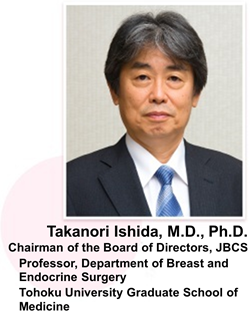Greeting

My name is Takanori Ishida, and I have recently been appointed Chairman of the Board of Directors of the Japanese Breast Cancer Society (JBCS). I served as a professor in the Department of Breast and Endocrine Surgery at Tohoku University Graduate School of Medicine, retired from Tohoku University in March 2025. I am currently a professor emeritus and visiting professor at Tohoku University. It is a great honor to assume this important role, and I do so with a profound sense of responsibility and commitment.
Since its establishment, our society has been developed and strengthened by the dedicated efforts of its past chairpersons, officers, and members. I am determined to build upon this solid foundation and work tirelessly to ensure its continued growth and advancement.
I graduated from Tohoku University School of Medicine in 1987 and completed my initial clinical training at Iwate Prefectural Central Hospital. In 1999, I joined the Second Department of Surgery at Tohoku University. Although I aspired to become a surgeon from my student days, I was drawn to the field of breast surgery after joining the department. It was a time when breast-conserving therapy was being introduced in Japan, and I was deeply impressed by the breadth and depth of both clinical practice and research in this field. Breast cancer care, which allows for close involvement with patients and their families from screening through diagnosis and treatment, has become increasingly fulfilling and rewarding.
Currently, breast cancer affects one in nine Japanese women during their lifetime, and the number of cases continues to rise. While Western countries have seen a decline in breast cancer mortality rates, Japan has yet to experience this positive trend. This remains a pressing and critical issue. In addition to promoting the development of new treatment methods, we must also place greater emphasis on preventive medicine, including screening programs.
Breast cancer care continues to evolve rapidly. In surgery, novel techniques such as radiofrequency ablation, endoscopic surgery, and robotic-assisted procedures are being introduced. In drug therapy, antibody-drug conjugates and other innovative agents are emerging. In radiation oncology, hypofractionated radiotherapy and new irradiation techniques are increasingly applied in clinical settings. Advances in imaging diagnostics, including AI-based technologies like computer-aided detection (CAD), are showing great promise. Moreover, the field of genetic medicine is developing rapidly, bringing significant changes to breast cancer diagnosis and treatment.
To ensure that these advances are delivered equitably across all regions, we must mobilize the collective strength of all healthcare professionals. Collaboration with related academic societies and organizations is also essential. The same applies to preventive medicine, where cooperation with government bodies and other sectors is crucial. I have been fortunate to serve in leadership roles across various breast cancer-related societies and organizations, and I intend to strengthen these valuable connections.
For example, the rates of risk-reducing mastectomy and salpingo-oophorectomy for individuals with pathogenic BRCA1 or BRCA2 variants, as well as reconstructive procedures using implants or autologous tissue, remain insufficient and vary widely by region. To address this, we will work closely with organizations such as the Japanese Organization for Hereditary Breast and Ovarian Cancer (JOHBOC) and the Japanese Society of Breast Oncoplastic Surgery to promote further progress in this area.
As the JBCS enters a new era of workstyle reform, improving the working environment for our members is becoming increasingly important. A healthy and balanced work environment for all healthcare professionals leads directly to high-quality patient care. The Society will therefore strive to provide support in this regard.
Another urgent issue is the recruitment of new members. We will actively engage in outreach to medical students and residents, inviting them to attend our annual meetings and regional conferences, and using web-based platforms to share the appeal and significance of working in breast cancer care. It is also essential that the younger generation, with their fresh perspectives and creativity, become involved in our field, ensuring its future sustainability. Within the Society, we aim to foster an environment that encourages open dialogue and supports proactive participation by enthusiastic members.
Finally, the JBCS is expected to serve as a global hub for evidence-based breast cancer care, not only in Japan but throughout Asia. We will promote the creation of scientific evidence that can drive changes in clinical practice through collaboration with other countries in the region. Nurturing the next generation of leaders in breast cancer medicine is also a key mission, and we will continue to invest in their development.
I sincerely ask for your continued guidance and support as we work together for the future of the Japanese Breast Cancer Society.
